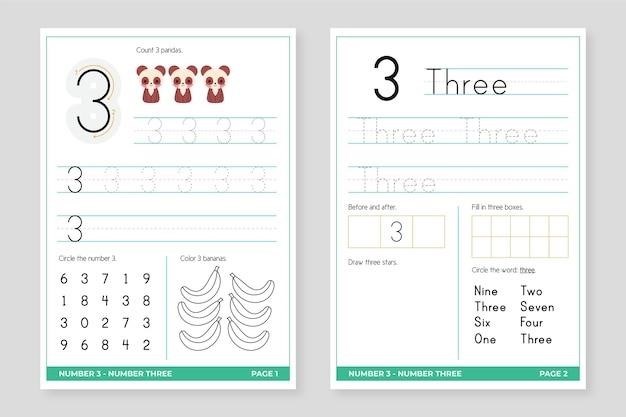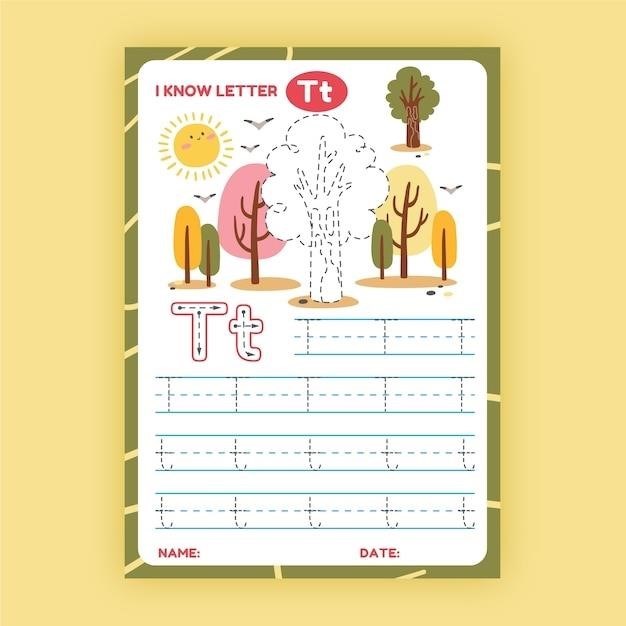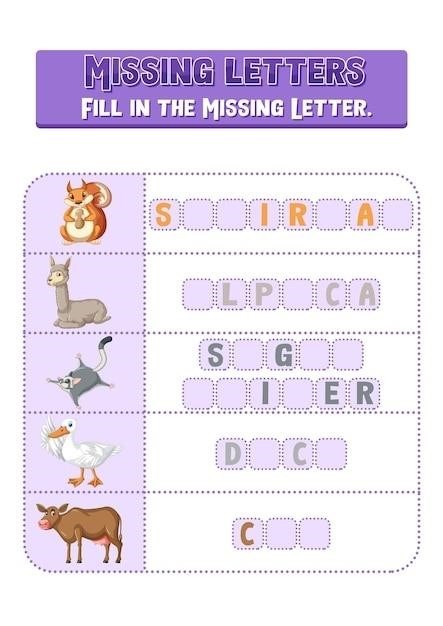
Year 1 English Worksheets PDF⁚ A Comprehensive Guide
This guide explores freely available Year 1 English worksheets in PDF format․ Discover diverse resources catering to reading comprehension, grammar, vocabulary, and specific skills like spelling and writing․ Find materials aligned with national curricula and explore printable and interactive options for effective home learning․
Finding Free Resources Online
The internet offers a wealth of free Year 1 English worksheets in PDF format․ A simple online search using keywords like “Year 1 English worksheets PDF free,” “free printable English worksheets Grade 1,” or “Year 1 English activities PDF” will yield numerous results․ Websites dedicated to educational resources, such as those offering free printable worksheets for teachers and parents, are excellent starting points․ Many educational blogs and websites provide free downloadable resources, often categorized by subject and skill level, making it easy to find materials relevant to Year 1 English curriculum․ Remember to check the source’s credibility and ensure the worksheets align with your child’s learning objectives and the national curriculum standards․ Be aware that the quality and suitability of free resources can vary; carefully review each worksheet before using it with your child․ Look for worksheets with clear instructions, age-appropriate content, and engaging activities that cater to different learning styles․ Explore different websites to discover a variety of resources and select those that best fit your child’s needs and learning preferences․ Don’t hesitate to compare several worksheets before making a choice to ensure you find the most suitable ones for your child’s learning journey․
Utilizing Online Platforms for Worksheets
Several online platforms specialize in providing educational resources, including Year 1 English worksheets․ These platforms often offer a wide selection of free and paid resources, allowing you to choose based on your needs and budget․ Some platforms provide interactive worksheets that offer self-correction and immediate feedback, enhancing the learning experience․ Others focus on printable PDF worksheets, allowing for offline use and flexibility in lesson planning․ When using online platforms, ensure the website is reputable and secure, protecting your child’s privacy and data․ Read reviews and check the platform’s terms of service before downloading any materials․ Many platforms allow users to filter worksheets by subject, skill level, and other criteria, making it easy to find the perfect resources․ Utilize the search and filtering functions to locate worksheets that specifically address your child’s learning gaps or focus on particular areas of English, such as phonics, reading comprehension, or grammar․ Consider the platform’s user interface and ease of navigation when selecting a resource․ A well-organized platform can save you time and effort when searching for appropriate worksheets․
Types of Free Year 1 English Worksheets
The availability of free Year 1 English worksheets is extensive and diverse․ You can find worksheets focusing on foundational skills like phonics, where children practice letter sounds and blending, crucial for early reading development․ Worksheets dedicated to vocabulary building introduce new words through engaging activities such as matching, labeling, or creating sentences․ Grammar worksheets cover essential grammatical concepts, such as sentence structure, parts of speech (nouns, verbs, adjectives), and punctuation․ Reading comprehension worksheets present short passages with accompanying questions to assess understanding and inferential skills․ Spelling worksheets provide practice with high-frequency words and common sight words, enhancing spelling accuracy․ Writing worksheets encourage creative expression and narrative skills through activities like story starters, sentence completion, or descriptive writing prompts․ Many worksheets incorporate colorful illustrations and engaging characters to maintain children’s interest and make learning fun․ This variety caters to different learning styles and ensures a comprehensive approach to English language development in Year 1․
Worksheets Focusing on Reading Comprehension
Free Year 1 English worksheets focusing on reading comprehension are readily available online and offer a range of activities to develop crucial skills․ These worksheets often present short, age-appropriate stories or passages followed by comprehension questions․ These questions can test literal understanding, requiring children to identify specific details from the text․ Other questions might assess inferential comprehension, challenging children to draw conclusions or make predictions based on the information provided․ Some worksheets include vocabulary exercises, helping children understand the meaning of new words within the context of the story․ Visual aids, such as illustrations or pictures, are frequently incorporated to support comprehension, especially for younger learners․ The difficulty level of the passages and questions often increases gradually, providing a scaffolded approach to enhance reading comprehension skills progressively․ Regular use of these worksheets can significantly improve a child’s ability to understand and interpret written text, fostering a love for reading and boosting overall literacy development․ The variety of themes and topics ensures engagement and caters to diverse interests․
Worksheets Focusing on Grammar and Vocabulary
Free Year 1 English worksheets dedicated to grammar and vocabulary development offer a structured approach to building foundational language skills․ These resources often introduce fundamental grammatical concepts such as sentence structure (subject-verb agreement), parts of speech (nouns, verbs, adjectives), and punctuation (full stops, commas)․ Activities might involve identifying parts of speech within sentences, creating simple sentences using provided words, or correcting grammatical errors in given sentences․ Vocabulary-focused worksheets typically introduce new words through various methods, including definitions, pictures, and context clues․ Activities might involve matching words to their definitions, using words in sentences, or completing fill-in-the-blank exercises․ Some worksheets incorporate games or puzzles to make learning more engaging, such as word searches or crossword puzzles․ The use of colorful visuals and interactive elements can enhance engagement and understanding, particularly for young learners․ Regular practice with these worksheets helps children develop a strong grammatical foundation and expand their vocabulary, leading to improved writing and communication skills․

Worksheets for Specific Skills (e․g․, Spelling, Writing)
Free, downloadable Year 1 English worksheets offer targeted practice in essential skills like spelling and writing; Spelling worksheets often focus on common sight words, phonetically regular words, and high-frequency words crucial for early literacy development․ Activities might involve tracing letters, writing words from dictation, or filling in missing letters to complete words․ The focus is on building accuracy and automaticity in spelling, preparing children for more complex writing tasks․ Writing worksheets provide opportunities for creative expression and structured writing practice․ These might include sentence completion exercises, story starters with prompts, or simple creative writing activities․ Some worksheets guide children through the writing process, teaching them to plan, draft, revise, and edit their work․ The emphasis is on developing fluency and clarity in writing, while also nurturing imagination and self-expression․ These worksheets often integrate visual aids and interactive components to keep young learners engaged and motivated․ The progressive difficulty of the tasks ensures a smooth learning curve, gradually challenging students as their abilities improve․
Accessing Worksheets Aligned with National Curriculum
Many websites offer Year 1 English worksheets meticulously aligned with national curriculum standards․ These resources ensure that the content directly supports what children are learning in school, reinforcing classroom instruction and providing supplementary practice․ Locating these curriculum-aligned worksheets often involves searching for specific learning objectives or key stage standards relevant to Year 1 English․ Websites dedicated to educational resources frequently categorize materials by curriculum framework, making it easy to find appropriate worksheets․ Reputable educational platforms often have quality assurance processes in place, ensuring accuracy and adherence to national standards․ Using these worksheets complements classroom learning, bridging the gap between school and home environments․ The consistent alignment of the worksheets with curriculum expectations helps maintain a cohesive learning experience for students, promoting better understanding and progress․ Parents and educators can confidently use these worksheets to supplement classroom activities, providing personalized practice and reinforcement․ This consistent approach ensures that children receive comprehensive support in mastering Year 1 English language skills․
Seasonal and Themed Worksheets
Adding an element of fun and engagement to learning, seasonal and themed worksheets offer a captivating approach to reinforcing Year 1 English skills․ These worksheets often incorporate festive imagery and relatable contexts, making learning more enjoyable and memorable for young learners․ For instance, autumn-themed worksheets might feature vibrant fall foliage and focus on vocabulary related to the season, such as “leaves,” “pumpkin,” or “harvest․” Similarly, Christmas-themed worksheets could incorporate festive vocabulary and stories, enriching children’s understanding of the holiday․ The diverse range of themes extends beyond seasonal celebrations․ Worksheets based on animals, transportation, or everyday objects can effectively engage children’s interest while reinforcing fundamental language skills․ Themed worksheets also provide opportunities for creative writing prompts, encouraging students to express their thoughts and understanding through storytelling․ This multi-faceted approach enhances learning by connecting educational content with familiar and engaging themes, ultimately leading to a more positive and effective learning experience․ The blend of educational content with captivating themes makes learning fun, boosting children’s enthusiasm and confidence in their language skills․
Printable vs․ Interactive Worksheets
The choice between printable and interactive Year 1 English worksheets depends largely on individual preferences and learning styles․ Printable worksheets, readily available as PDFs, offer a tangible learning experience․ Children can physically interact with the material, using pencils or crayons to complete exercises․ This tactile approach can be beneficial for kinesthetic learners․ The convenience of printing allows for immediate access and offline use, eliminating the need for internet connectivity․ However, printable worksheets may lack the dynamic elements that interactive ones offer․ Interactive worksheets, often found online platforms, provide engaging features such as animations, audio, and self-assessment tools․ This multi-sensory approach can enhance learning, especially for visually or aurally inclined learners․ The immediate feedback provided by interactive exercises fosters independent learning and allows students to track their progress․ While interactive worksheets provide a rich learning environment, they require internet access and may not be suitable for all learning environments․ The optimal choice depends on factors such as resource availability, individual learning styles, and the desired level of engagement․ Careful consideration of these factors will help educators and parents select the most appropriate worksheet type for each child․
Utilizing Worksheets for Home Learning
Year 1 English worksheets offer a valuable tool for supplementing classroom learning at home․ Parents can use these resources to reinforce concepts taught in school, providing additional practice and support․ Free PDF worksheets readily available online provide a cost-effective way to enhance a child’s learning experience․ The flexibility of printable worksheets allows for customized learning sessions tailored to a child’s pace and specific needs․ Parents can select worksheets focusing on areas where their child needs extra support, or they can choose themed worksheets to make learning more engaging․ Incorporating worksheets into the home learning routine can create a structured and positive learning environment, fostering a love of reading and writing․ However, it’s crucial to balance worksheet activities with other engaging learning experiences․ Overuse of worksheets can lead to boredom and diminish the child’s enthusiasm for learning․ A balanced approach involving interactive games, storytelling, and real-world applications of language skills will create a richer and more effective learning experience at home․ Parents should also remember to praise effort and celebrate achievements to foster a positive learning attitude․
Benefits of Using Worksheets in Year 1 English
Year 1 English worksheets offer numerous benefits for young learners․ They provide structured practice in foundational literacy skills, reinforcing concepts taught in the classroom․ Worksheets help children develop crucial skills such as letter recognition, phonics, reading comprehension, and vocabulary building in a focused and engaging manner․ The repetitive nature of many worksheet exercises helps to solidify learning and improve recall․ Furthermore, worksheets allow for independent practice, fostering self-reliance and a sense of accomplishment․ This self-directed learning can build confidence and encourage a positive attitude towards learning․ The visual nature of many worksheets can be particularly appealing to young children, making learning more enjoyable and less daunting․ Worksheets also provide valuable formative assessment opportunities for both teachers and parents․ By reviewing a child’s completed work, educators and parents can identify areas of strength and areas needing further attention․ This targeted support can contribute significantly to a child’s overall progress and academic success․ The availability of free, printable worksheets makes these resources accessible to all, regardless of socioeconomic background․
Integrating Worksheets into Lesson Planning
Effectively integrating free Year 1 English worksheets into lesson planning requires careful consideration․ Begin by aligning worksheets with specific learning objectives and curriculum standards․ Don’t simply use worksheets as filler activities; instead, integrate them strategically to reinforce key concepts taught during lessons․ Consider using worksheets as pre-teaching activities to introduce new vocabulary or concepts or as post-teaching activities to consolidate learning and assess understanding․ Vary the types of worksheets used to maintain student engagement and cater to diverse learning styles․ Incorporate a balance of independent practice and collaborative activities using worksheets․ For example, students could complete a worksheet individually and then discuss their answers in pairs or small groups․ Remember to allocate sufficient time for worksheet completion, allowing for both individual work and class discussion․ Don’t overload students with excessive worksheets; instead, select a few high-quality resources that address specific learning needs․ Regularly review the effectiveness of worksheet use by observing student engagement and analyzing their performance․ Adjust your approach as needed to ensure that worksheets are a valuable and productive part of your lesson planning․ Remember, the goal is to use worksheets to enhance learning, not to replace other teaching methods․
Evaluating the Quality of Free Worksheets
Critically evaluating free Year 1 English worksheets is crucial to ensure their effectiveness․ First, examine the worksheet’s alignment with the national curriculum or relevant learning objectives․ Does it target specific skills or knowledge appropriate for Year 1 students? Assess the clarity and simplicity of instructions; are they easily understandable for young learners? Check for age-appropriateness of content and visual appeal; are the activities engaging and visually stimulating? Consider the variety of activities included; does the worksheet offer a mix of question types, interactive elements, or creative tasks? Evaluate the worksheet’s assessment potential; does it provide clear criteria for evaluating student work? Look for answers or answer keys; this facilitates marking and feedback․ Examine the worksheet’s layout and design; is it well-organized, easy to read, and visually appealing? Consider the source of the worksheet; is it from a reputable educational website or organization? Does it show any signs of plagiarism or copyright infringement? Finally, conduct a trial run using the worksheet with a small group of students before widespread implementation․ Gather feedback from both students and teachers about its effectiveness and make adjustments accordingly․ Remember, a high-quality worksheet should be engaging, effective, and aligned with learning goals․
